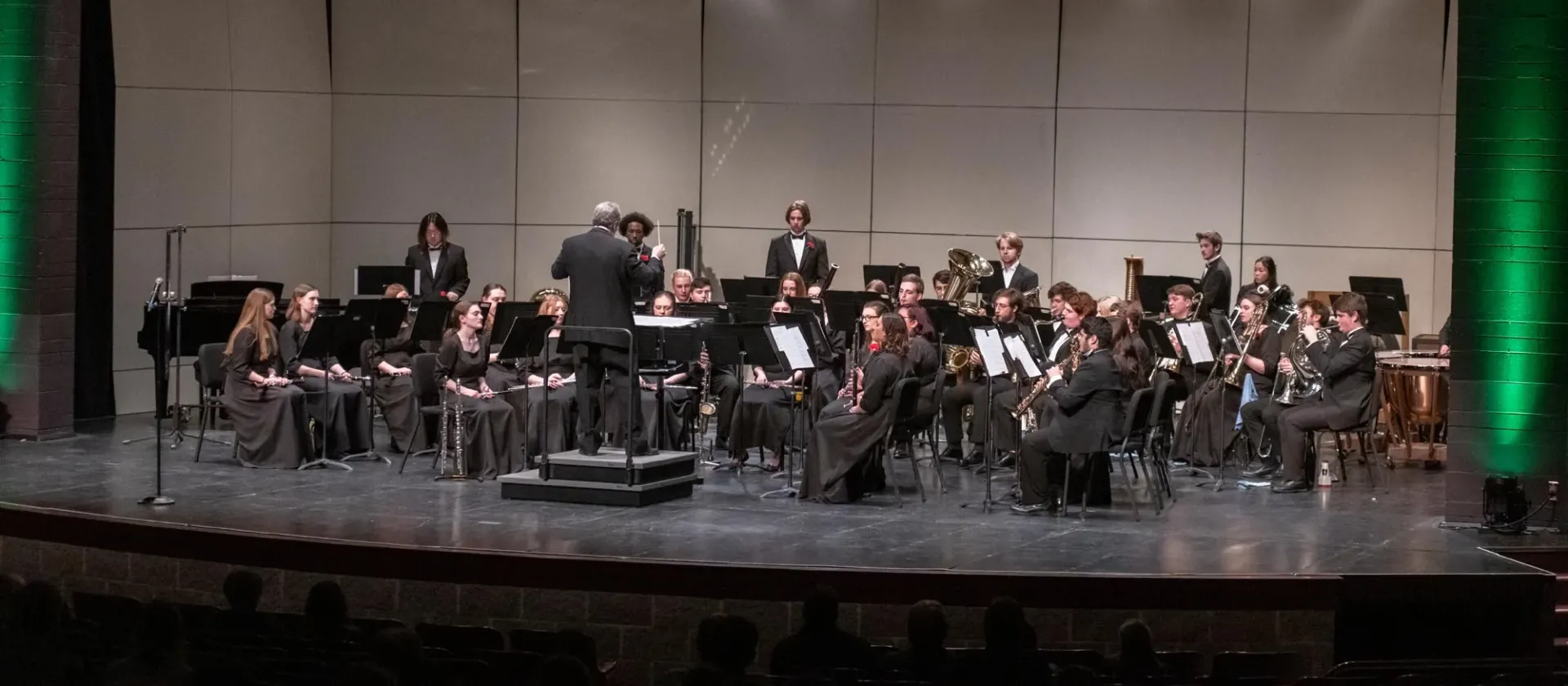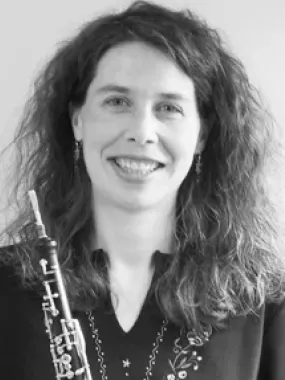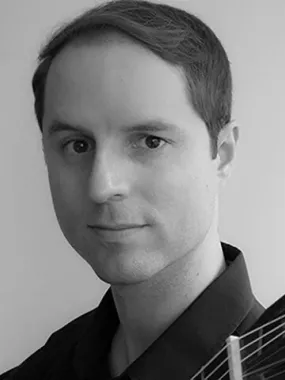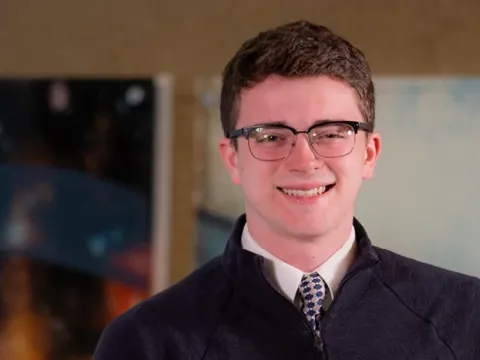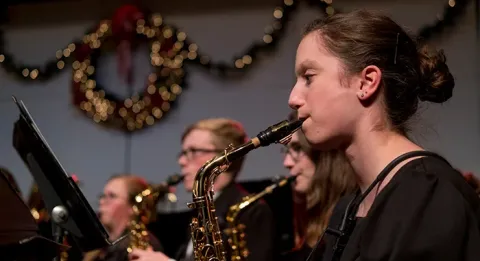-
Helpful info for
- Apply
- Visit
- Give
Popular Searches
Music Overview Make music with us – everyone is welcome! At St. Norbert College, we believe that music is more than a skill to master and is an integral part of who we are as humans. The music program at St. Norbert College invites you to express your individual feelings, communal values and societal conventions. When you study music theory, history and performance at SNC, you’ll connect time, language and culture. Grounded in the Catholic and Norbertine tradition, the music program emphasizes music as a practice of service, community and meaning. A thorough grounding in music lays the foundation for a life more deeply lived.
Students may pursue a music major or minor; however, everyone is welcome to make music at St. Norbert College. Whether you are pursuing a degree or you simply enjoy music, all incoming first-year students are welcome to audition for a music ensemble scholarship. Music merit scholarships are available regardless of major, allowing students across campus to participate in ensembles and reduce the cost of tuition. Come perform, learn and create with us — and make music an integral part of your college experience.
Credential Type
B.M.
Offered As
Major & minor
An Overview of SNC's Music Program: Learn all about the music program at SNC, including the different academic paths as well as the opportunities to participate in our concert bands, jazz band, string orchestra and choirs.
Academic paths At SNC, you can earn a degree in music education, music performance, sacred music or liberal arts with a music emphasis. SNC is widely recognized for its leadership in Catholic sacred music, with regular performances at St. Norbert Abbey and close collaboration with Norbertine musicians.
For those majoring in music education, you will be certified to teach all areas of music (choral, instrumental, and elementary general music) for grades K-12. Student teaching is completed as a full‑semester, 12‑credit internship in the fourth year, allowing graduates to begin their careers sooner than many comparable programs.
These pathways are to be used as a guide. Refer to the Course Catalog for official degree requirements.
Courses Checklist
MUSI 170 Music Theory 1
MUSI 171 Music Theory 2
MUSI 195 Music Entrepreneurship (2 cr)
MUSI 201 Beatmaking and Production (2 cr)
MUSI 270 Music Theory 3
MUSI 271 Music Theory 4
MUSI 371 Survey of Western Music 1, Core - WT
MUSI 372 Survey of Western Music 2
MUSI 381 Introduction to Conducting (2 cr)
MUSI 382 Advanced Choral Conducting (2 cr) or MUSI 383 Advanced Instrumental Conducting (2 cr)
MUSI 399 Junior Recital and Lessons (2 cr)
MUSI 499 Senior Recital and Lessons (2 cr)Additional Coursework
Piano performance majors (6 credits)
MUSI 019 Accompanying (1 semester)
MUSI 028 Piano Ensemble (1 semester)
MUSI 321 Piano Pedagogy 1
MUSI 329 Piano LiteratureFour semesters of lower division applied lessons on primary instrument (MUSI 05xM, 2 cr each) and two semesters of upper division applied lessons on primary instrument (MUSI 06xM, 2 cr each)
or Four semesters of lower division applied lessons on primary instrument (MUSI 05xM, 2 cr each) and one semester of upper division applied lessons on primary instrument (MUSI 06XM, 2 cr) and MUSI 420 Merit Recital (4 cr)Vocal performance majors (12-16 credits)
Eight semesters of principal ensembleTwo semesters of MUSI 016 Opera Workshop
MUSI 246 Vocal Diction I (2 cr)
MUSI 345 Vocal Literature (2 cr)
MUSI 349 Vocal Pedagogy
Core language requirement (102 level or above) demonstrated in French or GermanInstrumental performance majors (12 credits)
Eight semesters of principal ensembleOne of the following methods courses:
MUSI 362 Woodwinds
MUSI 363 Strings
MUSI 365 Brass
MUSI 366 Percussion*Specific requirements for instruments can be found in the college catalog or in speaking with an advisor.
Courses Checklist:
MUSI 170 Music Theory 1
MUSI 171 Music Theory 2
MUSI 195 Music Entrepreneurship (2 cr)
MUSI 201 Beatmaking and Production (2 cr)
MUSI 270 Music Theory 3
MUSI 271 Music Theory 4
MUSI 371 Survey of Western Music 1, Core - WT
MUSI 372 Survey of Western Music 2
MUSI 381 Introduction to Conducting (2 cr)
MUSI 382 Advanced Choral Conducting (2 cr) or MUSI 383 Advanced Instrumental Conducting (2 cr)
MUSI 399 Junior Recital and Lessons (2 cr)
MUSI 499 Senior Recital and Lessons (2 cr)
Four semesters of applied lessons on a single secondary instrument (1 cr each)
Four semesters of lower division applied composition (MUSI 057M, 2 cr each) and one semester of upper division applied composition (MUSI 067M, 2 cr)Additional (4 Credits)
Composition majors studying voice: (4 cr)
MUSI 102 Group Voice (2 cr)
MUSI 246 Vocal Diction I (2 cr)Composition majors studying other instruments: (2 cr)
One methods course (below) excluding that which includes their secondary instrument:
MUSI 362 Woodwind Methods (2 cr)
MUSI 363 String Methods (2 cr)
MUSI 365 Brass Methods (2 cr)
MUSI 366 Percussion Methods (2 cr)Courses Checklist:
MUSI 170 Music Theory I
MUSI 171 Music Theory II
MUSI 195 Music Entrepreneurship (2 cr)
MUSI 246 Vocal Diction (2 cr)
MUSI 270 Music Theory III
MUSI 271 Music Theory IV (2 cr)
MUSI 349 Vocal Pedagogy (2 cr)
MUSI 371 Survey of Western Music I
MUSI 372 Survey of Western Music II
MUSI 381 Introduction to Conducting (2 cr)
MUSI 382 Advanced Choral or MUSI 383 Instrumental Conducting (2 cr)
MUSI 471 Music in the Roman Catholic Rite
MUSI 494 Internship (8 credits, offered in sections of 1–8 credits, repeatable)
MUSI Capstone
Six primary ensemble courses
Four semesters of applied lessons on piano or organ (MUSI 05xM)
Three semesters of applied lessons on voice (MUSI 051)
Recommended: Electives in TheologyA new major built for musicians who want to make a meaningful impact through liturgy, ministry and performance.Courses Checklist:
MUSI 150 Survey of World Musics
MUSI 170 Music Theory 1
MUSI 171 Music Theory 2
MUSI 270 Music Theory 3
MUSI 271 Music Theory 4
MUSI 371 Survey of Western Music 1, Core - WT
MUSI 372 Survey of Western Music 2
MUSI 381 Introduction to Conducting (2 cr)
MUSI 399 Junior Recital and Lessons
Six principal ensembles on primary instrument
Four semesters of lower division applied lessons on primary instrument (MUSI 05xM) and two semesters of upper division applied lessons on primary instrument (MUSI 06xM)Additional Coursework
Choral Music Education Emphasis (16 credits)
MUSI 031 Improvisation Workshop (1 cr)
MUSI 052N Piano Lessons (1 cr) – 1 semester
MUSI 195 Music Entrepreneurship (2 cr)
MUSI 246 Vocal Diction I (2 cr)
MUSI 349 Vocal Pedagogy (2 cr)
MUSI 362 Woodwind Methods (2 cr) or MUSI 366 Percussion Methods (2 cr) or 2 semesters of a primary instrumental ensemble (MUSI 012, 014, 025) or 1 semester of instrumental lessons (MUSI 05xN) AND 1 semester of a primary instrumental ensemble
MUSI 382 Advanced Choral Conducting (2 cr)
EDUC 315 Choral Music Methods for Junior and Senior High School (2 cr)Instrumental Music Education Emphasis (17 cr)
MUSI 031 Improvisation Workshop (1 cr)
MUSI 051 Applied Voice (2 cr) or MUSI 102 Class Voice (2 cr) or Two principal choral ensembles MUSI 362 Woodwind Methods (2 cr)
MUSI 195 Music Entrepreneurship (2 cr)
MUSI 363 String Methods (2 cr)
MUSI 365 Brass Methods (2 cr)
MUSI 366 Percussion Methods (2 cr)
MUSI 383 Advanced Instrumental Conducting (2 cr)
EDUC 316 Instrumental Music in the Schools (2 cr)Note: Candidates interested in earning K-12 Music licensure must also complete the K-12 Teaching Major.
See Education [EDUC] section for the major as well as additional certification requirements
Courses Checklist:
MUSI 170 Music Theory 1
MUSI 171 Music Theory 2
MUSI 195 Music Entrepreneurship (2 cr)
MUSI 201 Beatmaking and Production (2 cr)
MUSI 270 Music Theory 3
MUSI 271 Music Theory 4 (2 cr)
MUSI 371 Survey of Western Music 1
MUSI 372 Survey of Western Music 2
MUSI 381 Introduction to Conducting
Six principal ensemble courses on primary instrument (1 cr each)
Four semesters of lower division applied music on primary instrument (MUSI 05xM, 2 cr each)Additional Coursework (4 credits)
One of the following:
MUSI 150 Survey of World Musics
MUSI 184 History of American Popular Music
MUSI 276 Music and Catholicism
MUSI 315 Introduction to Opera
MUSI 318 Evolution of JazzCourses Checklist:
MUSI 170 Music Theory 1
MUSI 171 Music Theory 2
MUSI 195 Music Entrepreneurship (2 cr)
MUSI 201 Beatmaking and Production (2 cr)
MUSI 270 Music Theory 3
MUSI 271 Music Theory 4 (2 cr)
MUSI 371 Survey of Western Music 1
MUSI 372 Survey of Western Music 2
MUSI 381 Introduction to Conducting
Six principal ensemble courses on primary instrument (1 cr each)
Four semesters of lower division applied music on primary instrument (MUSI 05xM, 2 cr each)
MUSI 494 Internship
PSYC 100 Introduction to Psychological ScienceAdditional Coursework (8-11 credits)
Two of the following:
MUSI 033 World Music Ensemble (1 cr)
MUSI 100 Group Guitar (2 cr)
MUSI 102 Group Voice (2 cr)
MUSI 150 Survey of World Musics
PSYC 212 Adult Psychopathology
PSYC 220 Lifespan Human Development
EDUC 317 General Music Methods
BIOL 105 Human Biology and Society
BIOL 120 Introduction to Cell and Molecular Biology
BIOL 216 Anatomy and Physiology I
BIOL 217 Anatomy and Physiology II
Additional discipline-approved electiveCourses Checklist:
MUSI 170 Music Theory 1
MUSI 381 Introduction to Conducting (2 cr)
Six principal ensemble courses on primary instrument (1 cr each)
Four semesters of applied music on primary instrument (MUSI 05xN, 1 cr each)Additional Coursework (8 credits)
Two of the following:
MUSI 150 Survey of World Musics
MUSI 176 Music Appreciation
MUSI 184 History of American Pop Music
MUSI 195 Music Entrepreneurship (2 cr)
MUSI 201 Beatmaking and Production (2 cr)
MUSI 276 Music and Catholicism
MUSI 315 Introduction to Opera
MUSI 318 Evolution of Jazz
MUSI 362 Woodwind Methods (2 cr)
MUSI 363 String Methods (2 cr)
MUSI 365 Brass Methods (2 cr)
MUSI 366 Percussion Methods (2 cr)
HUMA 100 Intro to Humanities thru the Fine ArtsCourses Checklist:
MUSI 170 Music Theory 1
MUSI 171 Music Theory 2
MUSI 381 Introduction to ConductingApplied lessons (14 cr), including all three of the following areas:
MUSI 051 Voice (minimum 4 cr)
MUSI 052 Piano (minimum 4 cr)
MUSI 055 Organ (minimum 4 cr)Four principal choral ensembles courses
Featured faculty If there’s one thing that SNC professors and instructors have in common, it’s a passion for teaching and sharing their expertise. You’ll also find them dedicated to providing personalized guidance that supports your academic and career aspirations. Discover the distinguished scholars you’ll be learning from.
View all faculty
 Kieran Wallace ’19
Kieran Wallace ’19“The nice thing about SNC is the faculty involvement. Who they are and how they teach is amazing. Because of them, I was able to grow a lot as a musician.”
Kieran Wallace ’19
Career outcomes Music is a major that can be woven into many careers. Whether you dream about performing music for a large audience or sharing the joy of instrumental or vocal music with others as a teacher, SNC can prepare you for success as a creative professional. Case in point: Our music education majors have a 100 percent placement rate after they graduate.
Graduates are supported by a faculty of active professional musicians whose work includes performances, commissions, recordings and national recognition — helping students build strong professional networks while still in college.SNC music alumni have held jobs such as:

- Band director
- Choir director
- Orchestra director
- General music teacher
- Church music director
- Professional performer or composer
- College professor
- School administrator
- Music therapist – hospital- to school-based
- Studio lesson instructor
- Arts administrator
- Content creator
- Church organist/musician
- Parochial school music educator (K-12)
- Composer/arranger of liturgical music
Graduate studies A music degree from SNC also lays the groundwork for graduate studies in related fields such as conducting, performance, history or musicology, composition, theory or music therapy — or a field that is informed by the study of music. Students strengthen their graduate‑school preparation through extensive performance opportunities, faculty mentorship and participation in more than 50 concerts, recitals and musical events hosted each year. With helpful preparation and placement assistance from SNC, our music alumni have attended graduate schools such as:
- Belmont University
- Berklee College of Music
- Medical College of Wisconsin
- New York University
- Oregon State University
- University of Iowa
- University of Minnesota
- University of Oregon
- University of Utah
- University of Wisconsin-Madison
Related clubs & organizations 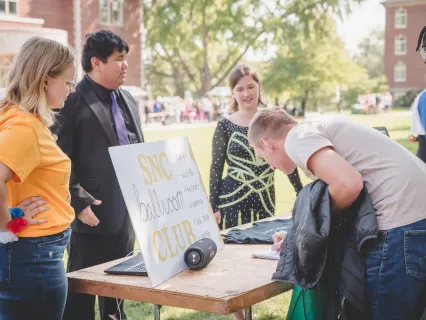 Ballroom ClubA club meant to create meaningful relationships through dance to further deepen our sense of community on and off campus by encouraging members to expand their...
Ballroom ClubA club meant to create meaningful relationships through dance to further deepen our sense of community on and off campus by encouraging members to expand their...Learn More 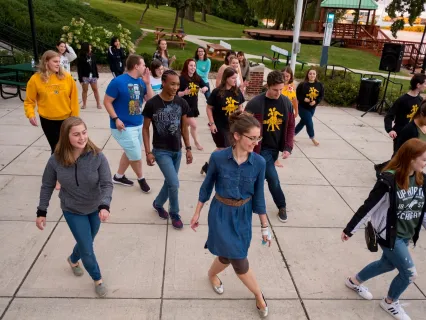 Dance ClubA place for students to partake in learning or teaching choreographed dance in genres such as jazz, contemporary, lyrical, hip hop, pom, and more.
Dance ClubA place for students to partake in learning or teaching choreographed dance in genres such as jazz, contemporary, lyrical, hip hop, pom, and more.Learn More
Related programs
- Helpful info for
